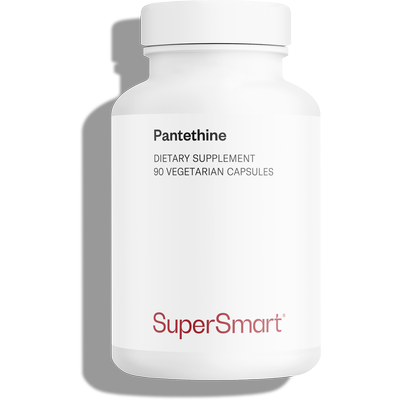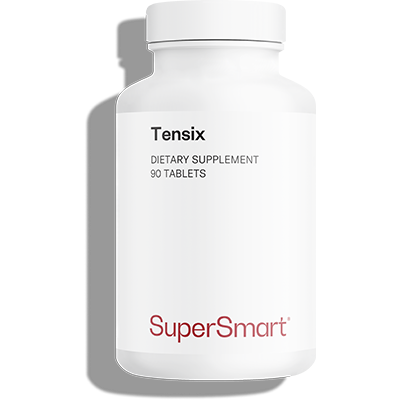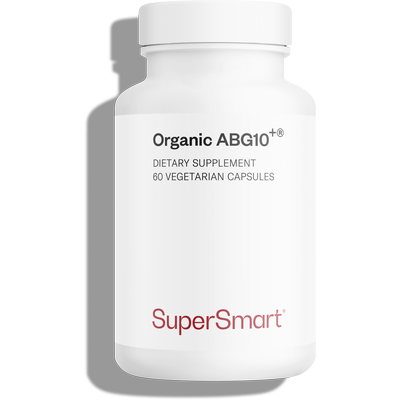Virtues of black garlic: 4 benefits of the aged form of this classic culinary bulb
An amazing, recently-developed form of this classic ingredient, black garlic is packed with benefits for health. Discover the 4 main virtues of this nutraceutical born in Japan.

Black garlic, an aged form but a youngster too!
While garlic has been used for centuries to flavour food, black or aged garlic only emerged in the 1990s, as a result of research by Japanese professor Jin-Ichi Sasaki.
Though it differs in name and appearance, botanically-speaking it is the same as traditional garlic (Allium sativum). It’s simply an aged version of it, in which heads of garlic are left to ferment in a contained environment, at a gentle heat (60°-90°C) and high humidity (70%-90%).
Over a period of 2 to 5 weeks, the garlic cloves become soft and candied, encased in a prune-like charcoal-coloured skin. This metamorphosis is the result of a large number of biochemical changes (1).
Top chefs were quick to adopt this unusual ingredient, enthusing over its umami flavour (the ‘5th taste’) with elements of balsamic vinegar and liquorice. The ageing process removes all the pungency of classic garlic, making it even more digestible. This is due to its much-reduced content of allicin (the molecule responsible for ‘garlic breath’) (2).
Interest in black garlic extends beyond the culinary world to the scientific community. The ageing process actually generates beneficial new compounds over and above the well-established properties of white garlic. Let’s take a look at its specific characteristics.
Black garlic and antioxidant activity
White garlic already has remarkable antioxidant properties but fermenting it significantly enriches its nutritional profile.
Several studies have, in particular, found black garlic to have significantly higher levels of polyphenols, phenolic compounds (3-4 times higher) and flavonoids (2-8 times higher) than its fresh counterpart (3-5).
Aged garlic is especially notable for its exceptional content of S-allyl cysteine, an organosulfur compound thought to account for many of its health benefits (6-7): while this compound is indeed present in white garlic, the black form is believed to contain 3-6 times more!
At the same time, the garlic-ageing process produces very powerful molecules not present in the white version: hydroxymethylfurfural (HMF) and melanoidins (8-9). These are compounds of the Maillard or browning reaction that give aged garlic its dark brown colour.
Benefits of black garlic for cardiovascular health
Like the fresh form, black garlic supports cardiac, vascular and vein health (10).
A number of studies have investigated its effects on subjects with hypertension. Consumption of black garlic over several weeks was found to modulate various key markers such as arterial stiffness, systolic blood pressure and pulse waves (11).
Animal studies have explored black garlic’s interaction with the renin-angtiotensin system, which plays a key role in regulating cardiovascular and renal function (12).
Aged garlic also seems to reduce platelet aggregation, a process involved in the formation of blood clots (13).
A cholesterol-lowering effect
Both black and white garlic have an artery-protective effect, helping to maintain healthy blood lipids including normal cholesterol levels (14). The more phytonutrient-rich fermented version may be particularly effective.
By way of example, in one study on subjects with mild hypercholesterolaemia, mineral-vitamin supplementation enriched with black garlic resulted in a rebalancing of the lipid profile. There were significant variations in levels of high-density lipoproteins (‘good cholesterol’) and of apolipoprotein B (a ‘bad cholesterol’ carrier) (15).
Aged garlic and the immune system
If it’s effective at driving away vampires, garlic also acts as a natural shield in supporting immune health and protecting the body against bacteria.
Scientists recently investigated the effects of black garlic on certain inflammatory and immune markers such as tumour necrosis factor alpha (TNF-α) and interleukin-6 (IL-6), in obese subjects and diabetic rats (16-17). Their findings open up new perspectives for this ingredient with yet more benefits to be discovered.
How can you obtain maximum benefit from black garlic?
You can of course use aged garlic to add flavour to your dishes, but take care not to heat it so as to preserve its valuable nutrients. However, to benefit from it in a more concentrated form, consider taking a black garlic supplement.
To help you choose the right one, look closely at the product’s content of active principles, such as S-allyl cysteine and melanoidins, both of which are a good gauge of optimal efficacy (the supplement Organic ABG10+®, for example, is based on an organic black garlic extract with 0.1% S-allyl cysteine, the highest level currently available, and with its high melanoidin content, offers on average 10 times more antioxidant activity than other black garlic supplements on the market).
Synergistic supplements to combine with aged garlic
Depending on your particular focus, other natural compounds can act synergistically with black garlic extract.
For blood pressure problems, an excellent option would be to also take potassium (which helps maintain normal blood pressure) and hawthorn (which supports normal cardiovascular function (18-19). Certain supplements offer this highly-effective combo (the innovative formulation Tensix combines potassium and hawthorn with other natural ingredients such as celery seeds and fish peptides).
Pantethine, a specific derivative of vitamin B5, is showing promise in the field of lipid metabolism (you can find it in the patented supplement Pantethine, the result of many decades’ research) (20).
SUPERSMART ADVICE
References
- Ahmed T, Wang CK. Black Garlic and Its Bioactive Compounds on Human Health Diseases: A Review. Molecules. 2021;26(16):5028. Published 2021 Aug 19. doi:10.3390/molecules26165028
- Kimura S, Tung YC, Pan MH, Su NW, Lai YJ, Cheng KC. Black garlic: A critical review of its production, bioactivity, and application. J Food Drug Anal. 2017 Jan;25(1):62-70. doi: 10.1016/j.jfda.2016.11.003. Epub 2016 Dec 5. PMID: 28911544.
- Ahmed T, Wang CK. Black Garlic and Its Bioactive Compounds on Human Health Diseases: A Review. Molecules. 2021;26(16):5028. Published 2021 Aug 19. doi:10.3390/molecules26165028
- Choi IS, Cha HS, Lee YS. Physicochemical and antioxidant properties of black garlic. 2014 Oct 20;19(10):16811-23. doi: 10.3390/molecules191016811. PMID: 25335109; PMCID: PMC6270986.
- Sato E, Kohno M, Hamano H, Niwano Y. Increased anti-oxidative potency of garlic by spontaneous short-term fermentation. Plant Foods Hum Nutr. 2006 Dec;61(4):157-60. doi: 10.1007/s11130-006-0017-5. PMID: 17075725.
- Ahmad MS, Pischetsrieder M, Ahmed N. Aged garlic extract and S-allyl cysteine prevent formation of advanced glycation endproducts. Eur J Pharmacol. 2007 Apr 30;561(1-3):32-8. doi: 10.1016/j.ejphar.2007.01.041. Epub 2007 Feb 1. PMID: 17321518.
- Ho SE, Ide N, Lau BH. S-allyl cysteine reduces oxidant load in cells involved in the atherogenic process. 2001 Jan;8(1):39-46. doi: 10.1078/0944-7113-00005. PMID: 11292238.
- Liang T, Wei F, Lu Y, Kodani Y, Nakada M, Miyakawa T, Tanokura M. Comprehensive NMR analysis of compositional changes of black garlic during thermal processing. J Agric Food Chem. 2015 Jan 21;63(2):683-91. doi: 10.1021/jf504836d. Epub 2015 Jan 12. PMID: 25549134.
- Kang OJ. Evaluation of Melanoidins Formed from Black Garlic after Different Thermal Processing Steps. Prev Nutr Food Sci. 2016 Dec;21(4):398-405. doi: 10.3746/pnf.2016.21.4.398. Epub 2016 Dec 31. PMID: 28078266; PMCID: PMC5216895.
- Liu J, Zhang G, Cong X, Wen C. Black Garlic Improves Heart Function in Patients With Coronary Heart Disease by Improving Circulating Antioxidant Levels. Front Physiol. 2018;9:1435. Published 2018 Nov 1. doi:10.3389/fphys.2018.01435
- Ried K, Travica N, Sali A. The effect of aged garlic extract on blood pressure and other cardiovascular risk factors in uncontrolled hypertensives: the AGE at Heart trial. Integr Blood Press Control. 2016 Jan 27;9:9-21. doi: 10.2147/IBPC.S93335. PMID: 26869811; PMCID: PMC4734812.
- Castro C, Lorenzo AG, González A, Cruzado M. Garlic components inhibit angiotensin II-induced cell-cycle progression and migration: Involvement of cell-cycle inhibitor p27(Kip1) and mitogen-activated protein kinase. Mol Nutr Food Res. 2010 Jun;54(6):781-7. doi: 10.1002/mnfr.200900108. PMID: 19904760.
- Rahman K, Billington D. Dietary supplementation with aged garlic extract inhibits ADP-induced platelet aggregation in humans. J Nutr. 2000 Nov;130(11):2662-5. doi: 10.1093/jn/130.11.2662. PMID: 11053504.
- Ha AW, Ying T, Kim WK. The effects of black garlic (Allium satvium) extracts on lipid metabolism in rats fed a high fat diet. Nutr Res Pract. 2015;9(1):30-36. doi:10.4162/nrp.2015.9.1.30
- Budoff MJ, Ahmadi N, Gul KM, Liu ST, Flores FR, Tiano J, Takasu J, Miller E, Tsimikas S. Aged garlic extract supplemented with B vitamins, folic acid and L-arginine retards the progression of subclinical atherosclerosis: a randomized clinical trial. Prev Med. 2009 Aug-Sep;49(2-3):101-7. doi: 10.1016/j.ypmed.2009.06.018. Epub 2009 Jun 30. PMID: 19573556.
- Xu C, Mathews AE, Rodrigues C, Eudy BJ, Rowe CA, O'Donoughue A, Percival SS. Aged garlic extract supplementation modifies inflammation and immunity of adults with obesity: A randomized, double-blind, placebo-controlled clinical trial. Clin Nutr ESPEN. 2018 Apr;24:148-155. doi: 10.1016/j.clnesp.2017.11.010. Epub 2018 Jan 3. PMID: 29576354.
- Saryono, Nani D, Proverawati A, Sarmoko. Immunomodulatory effects of black solo garlic (Allium sativum) on streptozotocin-induced diabetes in Wistar rats. Heliyon. 2021;7(12):e08493. Published 2021 Nov 27. doi:10.1016/j.heliyon.2021.e08493
- Xu C, Mathews AE, Rodrigues C, Eudy BJ, Rowe CA, O'Donoughue A, Percival SS. Aged garlic extract supplementation modifies inflammation and immunity of adults with obesity: A randomized, double-blind, placebo-controlled clinical trial. Clin Nutr ESPEN. 2018 Apr;24:148-155. doi: 10.1016/j.clnesp.2017.11.010. Epub 2018 Jan 3. PMID: 29576354.
- Wang J, Xiong X, Feng B. Effect of crataegus usage in cardiovascular disease prevention: an evidence-based approach. Evid Based Complement Alternat Med. 2013;2013:149363. doi:10.1155/2013/149363
- Evans M, Rumberger JA, Azumano I, Napolitano JJ, Citrolo D, Kamiya T. Pantethine, a derivative of vitamin B5, favorably alters total, LDL and non-HDL cholesterol in low to moderate cardiovascular risk subjects eligible for statin therapy: a triple-blinded placebo and diet-controlled investigation. Vasc Health Risk Manag. 2014;10:89-100. Published 2014 Feb 27. doi:10.2147/VHRM.S57116
Keywords
13 Hours
GOOD BRAND IN FOOD COMPLEMENTS
GOOD BRAND IN FOOD COMPLEMENTS - SERIOUS WITH GOOD DOCUMENTS AND DETAILS SCIENTIST. AND SERIOUS HONNEST COMMERZIALISATION. I HAVE TRUST IN THEIR PRODUCTS.
FENOGLIO Guy
1 Days
Very good experience
Very good experience, the products arrived in time, in perfect condition and are good quality. Thank you.
GABI TIRCOCI
7 Days
very good expereince
very good expereince
Jelena Đaković
7 Days
Very good products.
Very good products.
Agnes BENDSAK
9 Days
Just OK
Just OK, ordering from company for many years and being safisfied
Lynn Mae
10 Days
Recomendo
Produtos encomendados são recebidos atempadamente e de acordo com o anunciado! Muito satisfeita!
Carla Sofia
11 Days
Everything is great!
Everything is great!
Jonas
15 Days
The delivery was fast and the product…
The delivery was fast and the product is great
SOMMARIVA Gianni
17 Days
Great service and lots of information
Great service and lots of information
Gabi
20 Days
Service Satisfaction
I’m satisfied with the service; it fulfilled what it set out to do.
Anfhony Abreu
23 Days
Original product and fast delivery
Original product and fast delivery. I haven't started it yet, but will do soon.
Vincenza Catania
25 Days
Good quality
Good quality. Good service.
Leonel Guzman
27 Days
Top!!!!!!!!
Top!!!!!!!!
Michael
29 Days
Excellent!
Products are great and delivered fast!
PARDINI Debora
30 Days
From order to receive the product
From order to receive the product, the process is smooth & fast. It’s good to customers.
WONG Mei Ling
of experience
your money back
##montant## purchase







